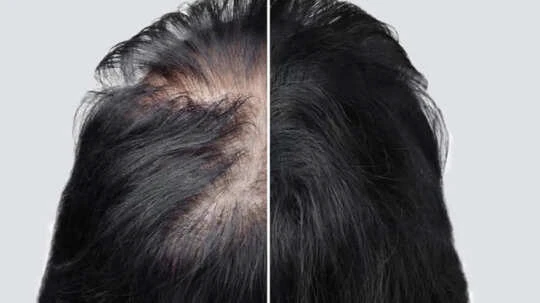Alopecia areata – commonly known as hair loss – to the partial or complete absence of hair where it normally grows. Doctors say that while it can be a symptom of various conditions, a few of which include autoimmune disorders, genetic factors, or hormonal changes, there are many myths related to it, which makes it an embarrassing episode, and hence, most people do not get it treated.
“One of the most common causes I see in the clinic is telogen effluvium. It’s when your hair cycle gets disturbed due to stress, illness, fever, or crash dieting. Happens more often than people think. The hair starts to shed a couple of months after the trigger, not right away. And yes, it’s temporary. It grows back. So no, not all sudden hair loss is alopecia in the scary sense,” Dr Viral Desai, board-certified super specialist, cosmetic plastic and hair transplant surgeon, and medical director – DHI India, told Times Now.
According to Dr Desai, not all hair loss is permanent, and International Alopecia Day is a good reminder to separate facts from fear.
Myths related to alopecia
Dr Desai says there are many common myths surrounding alopecia, most of which lead to misinformation and unnecessary worry. Let’s debunk a few of them.
Myth
Alopecia is solely genetic.
Fact
In reality, alopecia can be triggered by various factors like autoimmune conditions, hormone imbalance, environmental influences, stress, and infections. Doctors say genetics is a major contributor to the risk and development of these conditions.
“What’s worse is people rushing to buy miracle oils or random supplements off the internet. Honestly? That’s not helping. We can’t fix what we don’t understand. A proper diagnosis means running basic tests-checking iron, vitamin D, and thyroid-and listening to the whole story. Sometimes we prescribe minoxidil or do PRP therapy if needed. But it depends. No one size fits all,” said Dr Desai.
Myth
Alopecia means permanent damage
Fact
According to Dr Desai, if the hair loss has been happening for months, or if you start seeing bald patches, an itchy scalp, or discomfort, then yes, you must go and see a specialist. “Don’t panic, but don’t ignore it either,” he said.
Myth
Alopecia is contagious
Fact
This is completely false. Since alopecia areata is mostly an autoimmune disease and not an infection, it cannot be spread from person to person.
Myth
Shaving your head can help your hair grow back
Fact
Shaving the hair only affects the appearance of the hair shaft at the cut end, not the follicle or growth rate.
What happens when you get alopecia?
According to experts, alopecia areata causes your hair to fall out in patches, which are usually small and round, about the size of a quarter, but the shape and amount of hair you lose may be bigger or smaller. It also causes dents or pits in your nails known as cupuliform depressions, which makes them feel coarse or gritty, like sandpaper.
Alopecia areata does not typically affect your physical health. However, it can affect you psychosocially and mentally, altering your behaviour, leading to stress, anxiety, and depression.
